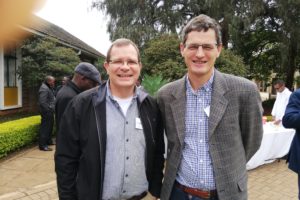Knowing how to speak to the poor is quite an art, or dare I say, a very special grace. It is the absence of this grace that lies at the root of so many of our woes in world today. Had the rich and the powerful known better how to speak to the poor and the powerless, life on this planet would have been much easier for us all. There is a proverb in the Bible that says: “The poor plead for mercy, but the rich answer harshly” (Prov. 18:23 NIV). In the New King James Version it goes like this: “The poor man uses entreaties, but the rich man answers roughly”.
But who are the poor? When Jesus told his hometown audience in the synagogue of Nazareth that he was anointed by God to preach the Gospel to “the poor” (Luke 4:18), what did he mean? Did he mean those who live on less than $2 a day? Did he think of folks like Lazarus, who lay by the gates of the rich with dogs licking their sores? Obviously not. The poor are all who are significantly less free, less worthy, less wealthy, less loved, less powerful, less famous, less healthy, less connected, less wanted, less successful, less skillful, less pretty, less smart, and above all less gifted with opportunities, than you and I. The Biblical category of “the poor” would however not have included those who are unwilling to work or to learn to make wise choices in life (see I Thess. 5:12-14). Proverbs would have fit them into another category, namely into that of “sluggards” and “fools”. And yet they also need the Gospel very desperately, because it alone can change them for good.
So how can we learn how to speak to the poor? Isaiah tells us in chapter 50:4 that Yahweh gave him a well-instructed tongue, to know how to sustain the weary. Let me just add here, that the poor certainly don’t need words only, for words without actions are hollow and cheap (just listen to the apostle of love in I John 3:16-18). But they do need words anyhow, and much more than we think. A survey I once saw in the USA Today showed that ordinary American workers long more for simple recognition by their employers, than for a pay-rise! Why is this so? Because, especially today, so many are struggling to live with hope, not necessarily because they miss a merciful God, but a merciful neighbour. God is able to fill someone with hope – crossing your way or mine – through a gentle smile, a few sincere words, and maybe even a hug.
Maybe we should first ask: what is the reason that the rich man answers harshly or roughly? Truth be told, he doesn’t even know how he sounds most of the time. Nor does he think much about it. But the poor remembers those harsh or rough words for a long time. An hour, a day or even a month later, the rich man had completely forgotten his brief exchange with the poor, while the poor is still struggling to come to grips with it. That is especially true if the poor does not want to sin against God by becoming angry or bitter, and so they turn to Psalm 37 and 73 again and again.
So how can we learn to speak to the poor in a way that would lift them up and bless ourselves, even when we can do very little to change their situation? Let me take my cue from Moses’ ancient book Deuteronomy. In it he seeks to prepare God’s people – who are still camping east of the Jordan – for life in the Promised Land overflowing with milk and honey. In chapters 8 and 9 he lays something on their hearts with great pastoral urgency: How are they going to handle prosperity and success? God was afraid that peace, wealth and success were going harm them. The children of Israel have been wandering in the desert for so long, and prior to that they were slaves in Egypt. What is success now going to do to them? We who are wealthy comparatively to others (whether literally or otherwise) would do well pondering God’s wisdom here in Deuteronomy.
Let me paraphrase and sum Moses’ words up in my own: “Hear oh Israel, you shall love the Lord your God with your entire being, in the land that you are about to possess. Take care lest you forget the Lord your God… Beware, lest you say in your heart: ‘My power and my might have gotten me this wealth’. You shall remember it is the Lord who has given you all these amazing gifts and opportunities…” (see 8:17). In the very next chapter (9:4) Moses is back on the same topic again. This time it’s all about military success. “Don’t say in your heart, after the Lord your God has thrust your enemies out before you, that it is because of your own righteousness that the Lord has brought you into the land’”. Both chapters deal in their entirety with this problem.
So lesson one is this: What are you and I saying to ourselves in our own hearts every day, with regards to our wealth, health, social standing, success, profits, achievements, etc. relatively to other people or nations? And what is the cumulative effect of our (often unconscious) self-congratulating? God would want us to realize that it was all 100% divine providence! Go read those two chapters: “It’s not because of you… it’s because of me!” Had you been born in a different place, from different parents, in different circumstances, etc. everything could have been so radically different for you. This is the first and most basic lesson to grasp if we want to learn how to speak to the poor.
Just consider the difference it makes whether you arrived in Canada as part of a wave of like-minded immigrants from your home-country after the Great War, or whether you arrived today, to the exact same spot, as a single family from the Far East? Just consider the language struggles you will face… not to mention all the others. Or consider whether you were born to a happy Christian family, or from divorced and atheistic parents? Or whether you took your first breath in a slum in Sao Paulo or in a middle-class suburb of the Mid-West?
But there is still more to come. The second lesson is found in chapter 16 where Moses gave Israel instructions about the annual Feast of Weeks celebrating the in-gathering of the harvest. The families of Israel were commanded to celebrate this feast with joy before the Lord, for all that he has provided for them during the past year. Twice it is said: “and you shall rejoice!” in verses 11 and again in 14. Guilt-feelings about the freedom and abundance God had given them, would have been an insult to His goodness. In fact, it is never an option. Only gratitude and joy are fitting in his presence. Guilt is only proper when we have acquired our wealth through oppression, greed and dishonesty, or when we live as scrooges and misers in this world. The only proper way to deal with guilt is by sincere repentance and restitution, for only the blood of Christ can wash our sins and guilt away. So that is the second lesson. Rejoice always, and be grateful before his face, for it will be the oil of gladness in your heart to pour out on the needy.
The third lesson is also found in 16:11 “And you shall rejoice before the Lord, your and son and your daughter, your male servant and your female servant, the Levite who is within your towns, the sojourner, the fatherless, and the widow who are among you…” (ESV). In Jesus’ words: “don’t invite only those who will or can invite you back, but invite the poor the lame, the cripple and the blind”.
In the Bible-belt of Ontario where we live, most Christians belong to large, successful families. That often creates a situation where believers from other socioeconomic backgrounds or even nationalities and religious affiliations, find it hard to fit in. Why? Family and social standing often comes first! We mostly celebrate with our “sons and daughters”, our brothers and uncles and those of our own clan, business and tribe. That is not what the Lord envisioned for his people. That must lead to a my-power-and-my-righteousness-have-done-this-syndrome, because we are so rarely challenged in our views and perspectives, or reminded of how richly blessed we are. It is by actively mingling with “the sojourner, the fatherless and the widow”, and by caring well for the “Levite in our towns” (who received no inheritance among us), that we learn the language of “the poor”. By neglecting or excluding them, we not only insult their Maker but miss the opportunity to learn that heavenly language of love that will last forever.

The last lesson to take to heart if we want to learn how to speak to the poor is found in Deuteronomy 16:12. It’s a refrain running through the entire Old Testament: “You shall remember that you were a slave in the land of Egypt…” How quickly do we not forget! Young Christians here in Ontario have a hard time appreciating the immense gratitude their forebears felt back in Holland, when Allied troops came to liberate Dutch towns and cities in 1945. We have also completely forgotten that our ancestors once worshiped metal and stone in the forests of Europe, before some odd British monks came from across the channel to bring us the blessed Gospel of light and of life. It takes the newcomers to either salvation in Christ or to political liberty to make us look with new eyes at our many blessings again… That is why countries to the east of modern Europe are so much more cautious about their hard-fought political freedoms than those on the western side. These countries only recently tasted freedom. The folks of Warsaw, Prague, Budapest and even in Moscow can still recall the sound of the cracking whip of their cruel slave masters. The others have a hard time imagining it.
For the most time we forget so quickly. We forget what we would have been without Jesus and his Word of grace in our lives. We forget where we would have been today had Charles Martel not defeat the invading Arab armies at Aquitaine in the Battle of Tours in 732, or had the Turks not been defeated at the Gates of Vienna in 1683. We slumber and sleep in our ungrateful forgetfulness. We live under the tyranny of the present, thinking things will always be like they have been yesterday.
The greatest blessing God can bestow upon us is to awake us again to the fact that “we were slaves in Egypt”. Jesus actually instituted a very special meal so that his disciples won’t forget what they were saved from. A simple meal to think back of the night in which he was betrayed… and what happened on the morrow that followed. For it was when the powers of darkness thought for a moment they had pulled off their biggest victory of all – by killing the Prince of Glory – that the world changed never to be the same again. God proved it by raising his Son from the dead. But what if Jesus had never been born into this world? Then we would not even have had access to the language of love, let alone to love and life itself. For this is love, that God gave us his only begotten Son, as an atoning sacrifice for our sins. Let us never forget that we “were slaves in Egypt”, for what a scared memory this is. And for those who are still slaving in Egypt, not sharing this most blessed memory with us, may the grace and power of God in Christ set you free.
So how shall we learn to speak to the poor again? By never even thinking we have deserved anything or accomplished it by our own strength, wisdom or goodness. All of that is a pile of demonic rubbish. It was divine providence, yes even the diligence to work hard and to make wise decisions come from above. Secondly, we shall learn it by being truly grateful and joyful in God’s presence for his abundant provision and mercy. Thirdly, we shall learn it by being truly inclusive in Gospel terms, celebrating his goodness not only for our own small group of family and friends, but with all who love him, especially those on the outer fringes. And lastly, we shall learn it by remembering where we came from… where his mercy found us when we were wallowing in our misery and sin, or perhaps, where we were crying out under oppression.
But there is one last thing to keep in mind also. The language that the poor need so badly from you and me has nothing to do with pampering them or with being politically correct. The truly poor of this world long for the unvarnished truth to be spoken as boldly as ever, as long as it is done with grace.








